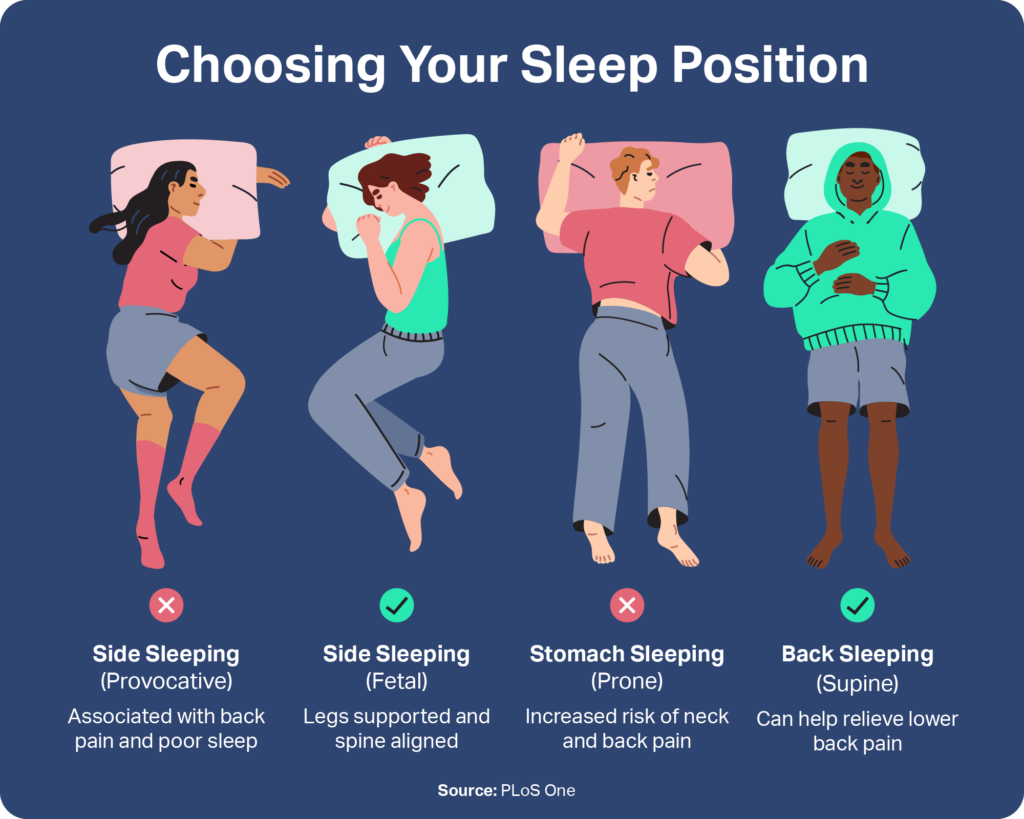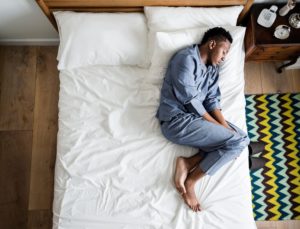Sleeping On Your Stomach – Is it Bad for You?
It is not uncommon for sleepers to wake up with pain in the morning. For some, this pain is due to an injury or chronic health problem. For others, it may be due to their sleep posture, especially if they sleep on their stomach.
Sleeping on your stomach has potential drawbacks. While there are some benefits to sleeping on your stomach, like reduced snoring, the position can create strain in your back and neck. That strain can lead to poor quality sleep at night, and aches and pains in the morning.
What Happens When You Sleep on Your Stomach?
Overall, people spend less than 10% of time asleep on their stomachs. There is a reason why this sleep position is so unpopular. Stomach sleeping can increase the likelihood of back, neck, and shoulder pain . Pregnant people in particular should avoid sleeping on their stomachs or backs.
If you prefer to sleep on your stomach, it may be helpful to understand how this position can worsen pain, and what you can do to lessen its detrimental effects.
Is Your Troubled Sleep a Health Risk?
A variety of issues can cause problems sleeping. Answer three questions to understand if it’s a concern you should worry about.
You Might Misalign Your Spine
The best sleep position is one that supports healthy spinal alignment . When you sleep on your stomach, your torso naturally sinks deeper into the mattress because of its weight. As a result, your back might arch, stretching your spine out of neutral alignment. When your spine is not aligned, you experience stress and strain, which may lead to aches and pains upon waking.
You Might Experience Back, Neck, or Shoulder Pain
Stomach sleeping may also increase your risk of neck pain. When you sleep on your stomach, you must turn your head to one side in order to breathe. Turning your head requires you to twist your neck, which moves it out of alignment with the rest of your spine.
Beyond back and neck pain, poor sleep posture can lead to additional complications such as headaches and shoulder or arm pain.
You Might Notice More Facial Wrinkles
When one side of your face is pressed into the pillow, it stretches, pulls, and compresses your skin throughout the night. As a result, sleeping on your stomach can contribute to facial wrinkles.
Risks of Sleeping on Your Stomach While Pregnant
During the first trimester of pregnancy, you might sleep comfortably in your normal sleep position. As your stomach grows, however, sleeping on your stomach might become uncomfortable. This discomfort could interfere with sleep. Over time, lower-quality sleep can lead to sleep deprivation. Sleep deprivation during pregnancy can increase your risk of experiencing premature birth, longer and more painful labor, and postpartum depression.
Instead of stomach sleeping, healthcare providers recommend pregnant people sleep on their left side. This position keeps pressure off the liver as well as the vein that carries blood from the legs back to the heart. It also improves blood flow to the fetus, uterus, and kidneys. Using a to support the abdomen and cushion the legs can make side sleeping more comfortable.
Should You Change Your Sleep Position?
If you sleep on your stomach and experience stiffness or soreness, you might want to try a new sleep position. Research shows stomach sleeping is the worst position for back support . Sleeping on your back or your side offers significantly more health benefits and less discomfort than sleeping on your stomach. For example, one study of sleepers with back pain found that those who switched to side or back sleeping reported significantly less back pain.

Changing how you sleep can be difficult. If you want to switch from stomach sleeping to side or back sleeping, there are techniques to make the switch successful. It may help to use a pillow to train your body to stay in your new preferred sleep position. Placing firm pillows, extra blankets, or a long body pillow on either side of your body can help prevent yourself from being able to easily roll over onto your stomach.
Side Sleeping
If snoring or sleep apnea are a concern, side sleeping may be the better position for you. It is worth acknowledging that sleeping on your stomach can reduce your risk of snoring and sleep apnea too, since this sleep position naturally keeps your airway open.
However, side sleeping provides a similar protective effect and comes with more benefits than stomach sleeping. For example, side sleeping can help relieve heartburn , snoring, and back pain. Side sleeping is the most popular sleeping position, favored by over 60% of people.
Back Sleeping
Back sleeping can help relieve back pain, and lessen your risk of facial wrinkles. It is easiest to keep your spine aligned in this position. However, back sleeping can also increase your risk of snoring and sleep apnea, since the position more easily allows your tongue to fall back into your throat.

Tips for Improving Stomach Sleep
Some people cannot get comfortable sleeping on their back or side, despite making an effort. If you relate and do not want to stop stomach sleeping, try these tips to minimize the potential downsides of sleeping on your stomach.
Use Thin Pillows
When you sleep on your stomach, try sleeping with a very thin pillow beneath your head, or no pillow at all. The thicker your pillow, the more strain your neck experiences, since the pillow forces it to angle upward. When you sleep without a pillow, with your head lying directly on the mattress surface, your head and neck are more likely to remain aligned with your spine.
To further align your spine, place a thin pillow beneath your pelvis, with the pillow positioned between your lower abdomen and mid-thigh. This placement prevents your midsection from sinking into the mattress too deeply, and relieves pressure from your spine.
Invest in a Firmer Mattress
The best mattress for stomach sleepers is one on the firmer side, with just enough give to provide relief for your major pressure points. Typically, that is a mattress with a medium to firm firmness rating, depending on your body weight and personal preferences. Lighter-weight people may prefer a mattress on the softer end of that range, while heavier individuals tend to sleep better on a firmer mattress.
Do Morning Stretches
It may be beneficial to realign your spine with some gentle morning stretches in the morning. In addition to helping relieve tension, the movement can help wake you up and energize you.
When to Talk to Your Doctor
Sleeping on your stomach is not recommended by most sleep experts, but there are actions you can take to make it more comfortable. If you have tried a few sleep positions and you are still not getting restful sleep, talk to your doctor. They can provide personalized guidance to improve your sleep, based on your personal medical history.

Still have questions? Ask our community!
Join our Sleep Care Community — a trusted hub of sleep health professionals, product specialists, and people just like you. Whether you need expert sleep advice for your insomnia or you’re searching for the perfect mattress, we’ve got you covered. Get personalized guidance from the experts who know sleep best.
References
8 Sources
-
Skarpsno, E. S., Mork, P. J., Nilsen, T., & Holtermann, A. (2017). Sleep positions and nocturnal body movements based on free-living accelerometer recordings: Association with demographics, lifestyle, and insomnia symptoms. Nature and Science of Sleep, 9, 267–275.
https://pubmed.ncbi.nlm.nih.gov/29138608/ -
Cary, D., Briffa, K., & McKenna, L. (2019). Identifying relationships between sleep posture and non-specific spinal symptoms in adults: A scoping review. BMJ Open, 9(6), e027633.
https://pubmed.ncbi.nlm.nih.gov/31256029/ -
A.D.A.M. Medical Encyclopedia. (2020, June 2). Problems sleeping during pregnancy. MedlinePlus., Retrieved July 19, 2021, from
https://medlineplus.gov/ency/patientinstructions/000559.htm -
Lee, W. H., & Ko, M. S. (2017). Effect of sleep posture on neck muscle activity. Journal of Physical Therapy Science, 29(6), 1021–1024.
https://pubmed.ncbi.nlm.nih.gov/28626314/ -
Anson, G., Kane, M. A. C., & Lambros, V. (2016). Sleep wrinkles: Facial aging and facial distortion during sleep. Aesthetic Surgery Journal, 36(8), 931–940.
https://pubmed.ncbi.nlm.nih.gov/27329660/ -
Chang, J. J., Pien, G. W., Duntley, S. P., & Macones, G. A. (2010). Sleep deprivation during pregnancy and maternal and fetal outcomes: Is there a relationship?. Sleep Medicine Reviews, 14(2), 107–114.
https://pubmed.ncbi.nlm.nih.gov/19625199/ -
Desouzart, G., Matos, R., Melo, F., & Filgueiras, E. (2015). Effects of sleeping position on back pain in physically active seniors: A controlled pilot study. Work, 53(2), 235–240.
https://pubmed.ncbi.nlm.nih.gov/26835867/ -
Khoury, R. M., Camacho-Lobato, L., Katz, P. O., Mohiuddin, M. A., & Castell, D. O. (1999). Influence of spontaneous sleep positions on nighttime recumbent reflux in patients with gastroesophageal reflux disease. The American journal of gastroenterology, 94(8), 2069–2073.
https://pubmed.ncbi.nlm.nih.gov/10445529/














